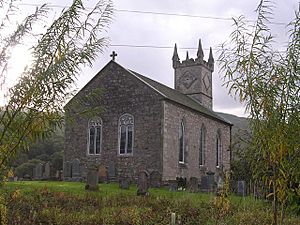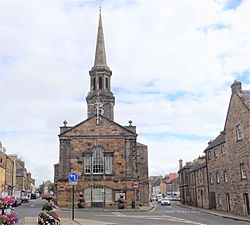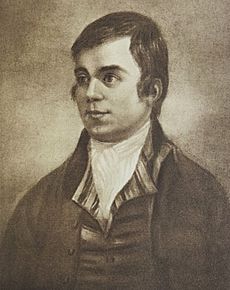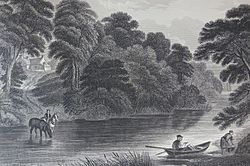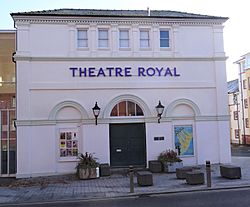Robert Graham of Fintry facts for kids
Quick facts for kids
Robert Graham, 12th Laird of Fintry
|
|
|---|---|
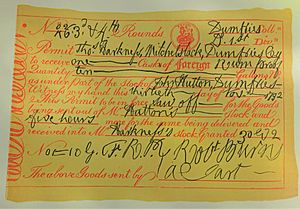
An Excise Permit completed by Robert Burns.
|
|
| Born | 17 January 1749 Fintry
|
| Died | 10 January 1815 |
| Occupation | Commissioner of Excise |
Robert Graham of Fintry was the 12th Laird of Fintry, a title for a Scottish landowner, near Dundee. He was a very helpful friend and supporter of the famous poet Robert Burns. Robert Graham worked as a Commissioner for the Scottish Board of Excise, which collected taxes on goods. He helped Burns with his job in the Excise and also when Burns faced questions about his loyalty. Graham greatly admired Burns's poems, and Burns often wrote letters to him. Burns even called him "Friend of my Life - True Patron of my Rhymes.".
Contents
Robert Graham's Life Story
Robert Graham was born in 1749. His father, also named Robert Graham, was the 11th Laird of Fintry. His father passed away when Robert junior was only seven years old. Robert was taught at home and then went to school in Haddington. After that, he studied at St Andrews University.
In 1770, when he was 21, Robert took over managing his family's land in Forfarshire. However, by 1780, he had to sell the property because of money problems. Even after selling, he was allowed to keep his title as Laird of Fintry. For a while, he managed lands for other important people, like Archibald Douglas and the Earl of Strathmore. In 1787, he was appointed as a Commissioner for the Scottish Board of Excise. This was a very important job.
On April 12, 1773, Robert married Margaret Elizabeth Mylne. They were second cousins. They had a large family with ten daughters and four sons. Robert Graham passed away in 1815 at the age of 65. He was related to other notable Grahams, including John Graham, 1st Viscount Dundee. Robert Graham was a Whig, which was a political group, and he also held some Jacobite beliefs. His home in Edinburgh was on George Street.
Later, in the 1990s, it was discovered that Robert Graham received money in 1793. This money came from a fund used to spread information supporting William Pitt, a politician. Graham wrote letters about people in the Dundee area who wanted big changes in society. He also managed a group of people who gathered information for him.
Robert Graham and Robert Burns
Robert Graham first met Robert Burns on August 31, 1787. They met at Athole House in Blair Atholl during Burns's trip through the Highlands. In January 1788, Burns wrote to Graham, asking for his help to get a job in the Excise. Graham gave Burns his full support. Later, in December 1792, when Burns's loyalty to the government was questioned, Graham again stood by him.
Burns's doctor in Edinburgh, Sandy Wood, is said to have spoken to Graham on Burns's behalf. Burns had told his doctor he was interested in joining the Excise.
Burns first mentioned Graham in a letter on September 5, 1787. He described his time at Athole House and specifically mentioned "Mr Graham of Fintrie's charms of conversation". This shows he enjoyed talking with Graham.
On August 2, 1787, Burns wrote to Frances Dunlop about Graham. He called him "one of the worthiest and most accomplished Gentlemen, not only of this Country, but I will dare say it, of this age.".
After his main supporter, James Cunningham, Earl of Glencairn, passed away in 1790, Burns saw Graham as his most important remaining friend. Graham had a lot of influence. Burns called Graham a "Friend of the Poet, Tried and Leal (loyal).". Burns often sent copies of his poems and songs to Graham.
Burns was supposed to train for the Excise in Edinburgh. However, with Graham's help, his training was moved to Tarbolton, closer to his home. He had to pay his supervisor, George Johnston, and Graham for parts of his training.
In July 1789, Burns told Graham that he was thinking about giving up farming completely. By January 1790, Burns had decided to rely only on his Excise job for income. He hoped Graham would help him get promotions.
In January 1794, Burns wrote to Graham suggesting that a part of the Excise, the Second Division, should be removed. He explained that the war had reduced imports, making the Excise workload lighter. Burns said he didn't want any public servant to "eat the bread of idleness" (meaning, get paid for doing nothing). He asked Graham not to tell anyone he was the one who made the suggestion.
Burns's short trip to Galloway in June 1794 might have been an attempt to find another supporter. Graham had not yet been able to get him a promotion, though Graham was working on a transfer for him. Burns hoped Patrick Heron, a landowner, would help him become a Supervisor.
In 1796, when Burns was very ill, Graham could not put him back on full pay. Instead, Graham sent him a personal gift of £5 to help him.
Letters with Robert Graham
About twenty letters between Burns and Graham still exist. Burns's poems sometimes touched on political topics. He clearly trusted Graham's friendship and careful judgment. These letters are kept at the Robert Burns Birthplace Museum in Alloway, South Ayrshire.
On January 7, 1788, Burns wrote to Graham about joining the Excise. He said, "I now solicit your Patronage. You know, I dare say, of an application I lately made to your Board, to be admitted an Officer of Excise. I have according to form, been examined by a Supervisor, and today I give in his Certificate with a request for an Order for instructions.". This means he was asking for Graham's help to get the job.
In September 1788, writing from Ellisland Farm, Burns called his Excise job "my sheet anchor in life" (meaning his main support). He also included his poem "Epistle to Robert Fintry Esq., of Fintry.".
On September 10, 1788, Burns wrote a poem "To Robert Graham of Fintry, Esq., with a request for an Excise Division":
|
"Why shrinks my soul, half-blushing, half-afraid, |
This poem came with a letter where Burns explained that his farm, Ellisland Farm, was not as good as he expected. He also said he had lent money to his brother Gilbert and sisters, so he had no savings for Ellisland. Then he asked for a specific Excise job: "There is one way by which I might be enabled to extricate myself from this embarrasment, a scheme which I hope and am certain is in your power to effectuate. I live here, Sir, in the very centre of a country Excise-Division; the present Officer lately lived on a farm which he rented in my nearest neighbourhood; and as the gentleman, owing to some legacies, is quite opulent, a removal could do him no manner of injury; and on a month's warning, to give me a little time to look again over my Instructions, I would not be afraid to enter on business. I do not know the name of his Division, as I have not yet got acquainted with any of the Dumfries Excise People; but his own name is Leonard Smith. It would suit me to enter on it, beginning of next Summer...".
The officer, Leonard Smith, was moved. Burns got the Excise area where he lived, which was unusual. Normally, officers were not placed in their home areas to prevent them from becoming too friendly with locals. Also, Excise officers usually couldn't have more than two children, and there was an age limit of thirty. Burns was 29 at the time.
One reason Burns wanted an Excise job was that the "roving life of a gauger would facilitate the collection of material for a Scottish drama he had then in contemplation.". This means he thought traveling for the job would help him gather ideas for a play.
Burns followed up on September 1, 1789, with "To Mr Graham of Fintry, On being appointed to my Excise Division.":
|
"I call no goddess to inspire my strains, |
Burns wrote to Graham about his work, saying, "I have found the Excise business go on a great deal smoother with me than I apprehended; owing a good deal to the generous friendship of Mr Mitchell, my Collector, and the kind assistance and instruction of Mr Findlater, my Supervisor - I dare to be honest, and I fear no labor.".
He also explained his work methods: "I recorded every defaulter; but at the court, I myself begged off every poor body that was unable to pay, which seeming candour gave me so much implicit credit with the Hon. Bench that with high Compliments they gave me such ample vengeance on the rest that my Decreet is double the amount of any Division in the District.". This means he reported everyone who didn't pay, but he also spoke up for poor people who couldn't afford to pay.
"Epistle to Robert Graham Esq: of Fintry on the Election of the Dumfries string of Boroughs, Anno 1790":
|
Fintry, my stay in worldly strife, But where shall I go rin a ride, |
In September 1790, Burns told Graham that he would gain important experience and earn more money if he moved to a Port Division. These were places like Dumfries, Port Glasgow, or Greenock. He hoped to be promoted to a Supervisor job in the North of Scotland.
In December 1792, Burns faced accusations of being disloyal to the government after an event at Dumfries's Theatre Royal. He wrote to Graham on the last day of that year, asking for help. He wrote: "I believe, Sir, I may aver it, and in the sight of Omnipotence, that I would not tell a deliberate Falsehood... and I say, that the allegation, whatever villain has made it, is a LIE! To the British Constitution, on Revolution principles, next after my God, I am mosy devoutly attached". The Excise started an official investigation. Burns kept his job only because of his strong friendship with his bosses and his excellent work as an officer.
The first part of the 1791 "Epistle to Robert Graham Esq., of Fintry":
|
"Late crippled of an arm, and now a leg, |
This poem was like a request for help from "Generous Graham."
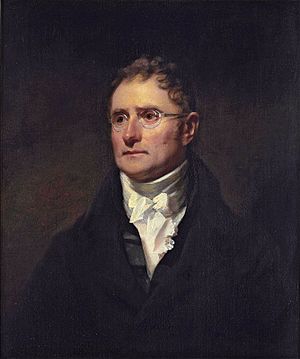
In 1794, Burns wrote his last known letter to Graham, again asking for a promotion. He ended the letter by saying: "Should the Chapter of Chances and Changes, which God forbid! ever place a Child of yours in the situation to need a Friend, as I have done; may they likewise find that Generous Friend that I have found in YOU!".
Burns also wrote to Graham's oldest daughter, Anne. He sent her a copy of "Select Collection of Original Scottish Airs" by George Thomson. On the title page, he wrote, "Here, where the Scottish Muse immortal lives.". He also asked Thomson to send her a copy of his 'Sonatas'. To Elizabeth Graham, Robert's wife, he sent a copy of his poem "The Rights of Women". He also gave her a signed copy of the 1793 Edinburgh Edition of his poems. Inside, he wrote, "It is probable, Madam, that this page may be read when the hand that now writes it, is mouldering in the dust.".
See also
- Robert Aiken
- Robert Ainsslie
- Jean Armour
- John Ballantine
- Lesley Baillie
- Alison Begbie
- Nelly Blair
- Isabella Burns
- May Cameron
- Mary Campbell (Highland Mary)
- Jenny Clow
- Gavin Hamilton (lawyer)
- Helen Hyslop
- James McKie
- John Syme (lawyer)
 | Percy Lavon Julian |
 | Katherine Johnson |
 | George Washington Carver |
 | Annie Easley |


